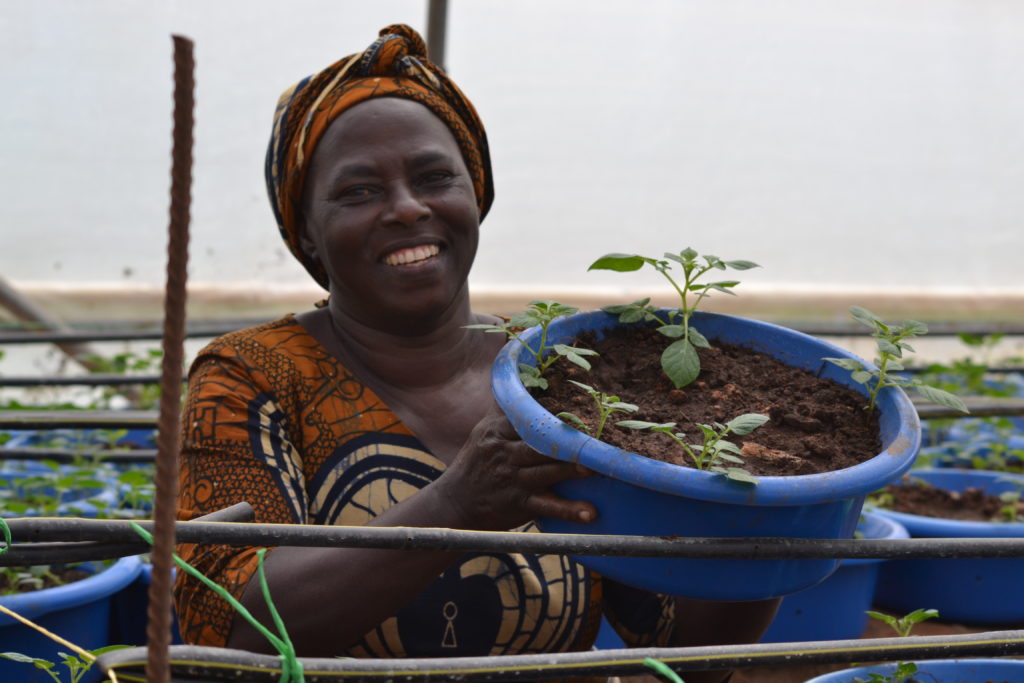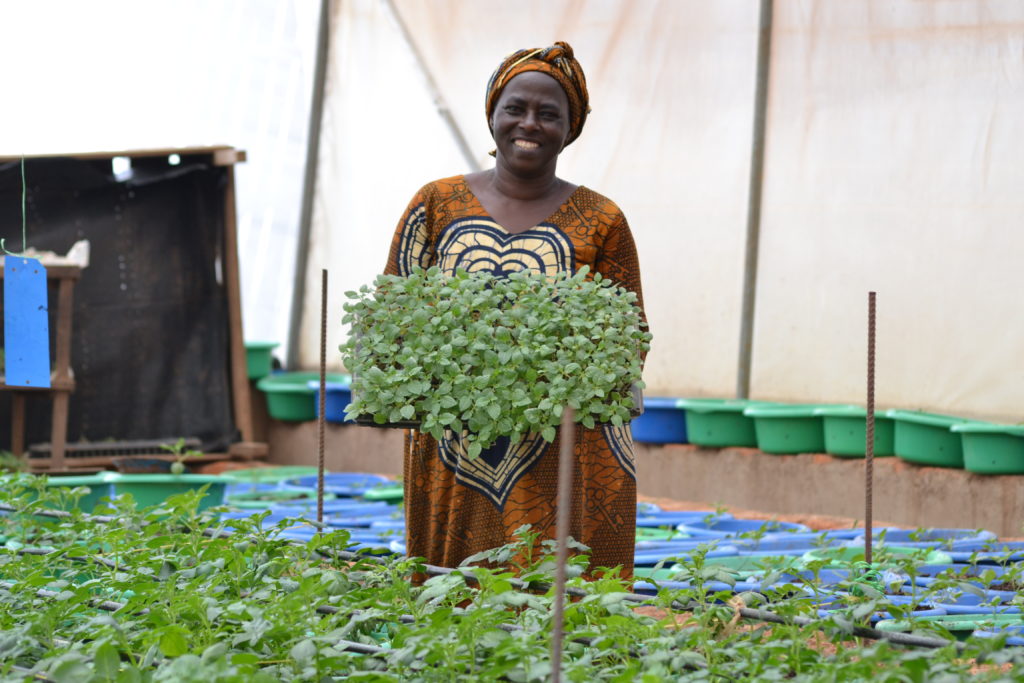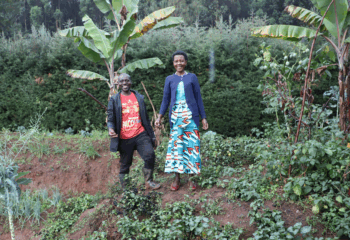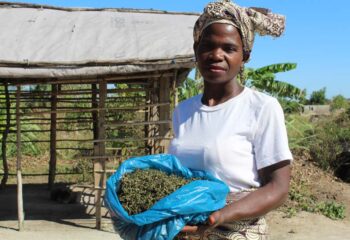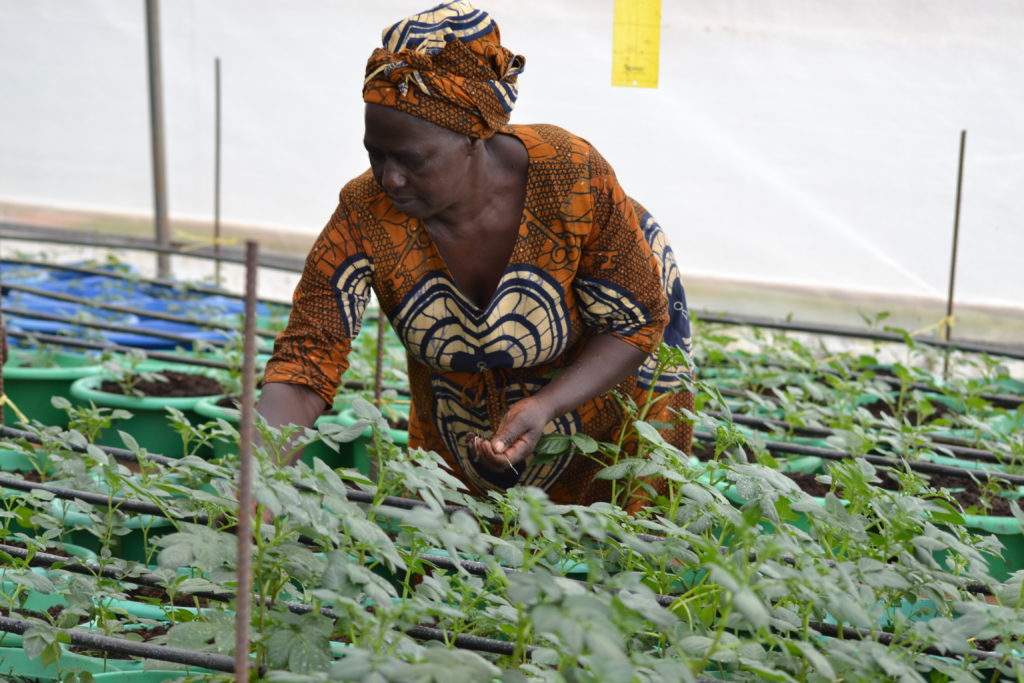
The International Fertilizer Development Center (IFDC), through its Resilient and Efficient Agribusiness Chains (REACH) project in Uganda, has worked to create potato value chains that benefit all actors, from farmers to processors and consumers. The project has trained 11,312 potato farmers from 885 farmer groups, with a special focus on women, in good agronomic practices and farming as a business. Additionally, 30% of the farmer groups that have been introduced to micro, small, and medium enterprises (MSMEs) are now selling produce to MSMEs in western Uganda.
Women all over Uganda have faced challenges in agribusiness due to cultural traditions that make it difficult for females to own land and the perception that they are incompetent in business. The REACH project emphasizes women’s economic empowerment, considering that they contribute to at least 70% of the labor in agricultural work. They are the ones involved in tilling the land and planting the seedlings that are harvested for home consumption and the surplus for selling in markets.
Fidelis Karugaba, a 63-year-old woman with six children and seven grandchildren who resides in Karukara village in Rubanda District, is one of the beneficiaries of IFDC support, and she argues that without that support she would not have succeeded in Irish seed potato production.
I started Irish seed potato production in 2002 on a small scale. I used to harvest 8 to 15 bags per season until 2012 when IFDC started supporting me, and since then, my production has increased to 600 bags of Irish seed potato per season, or 1,200 bags per year.
Fidelis Karugaba
She says she opted for seed potato production because it proved to be well paying compared to the other crops she initially planted. She adds that training from IFDC and Kachwekano Zonal Agriculture Research and Development Institute equipped her with better farming practices required for clean seed production, and now many women groups and individual Irish potato farmers have learned a lot from her, thus increasing their production.
“After experiencing the increased need for clean Irish seed potato in Kigezi Region in Uganda, I had to relocate the project from Karukara village to Karungu village. In 2014, I received a donation of a screenhouse from IFDC. This helped me produce an average of 67 bags of pre-basic Irish seed potato per season, which I supply to Kigezi Farmers Resource Center. This company is owned by my family members who, in turn, plan to get the basic seed that will eventually be supplied to farmer groups in Kigezi and government institutions for planting. IFDC subsequently partnered with our company to establish another screenhouse and a modern seed potato store, currently under construction, which I am sure will boost our clean seed production,” Karugaba added.
She also notes that working with her husband, John Mary K. Karugaba, and her six children, all of whom have now graduated from university, in seed production under their Kigezi Farmers Resource Center has not only created harmony and transparency but has also helped a lot in collective marketing and distribution of the clean seed potato.
She says that her project is empowering over 80 women who are employed during planting and harvesting. Each woman is paid UGX 7,000 (about U.S. $2) per day for their labor and is gaining skills on clean seed potato production.
“Providing education for my children, buying over 30 acres of land on which the pre-basic Irish potato seed is planted, constructing a permanent house, and paying fees for vulnerable children are some of the achievements I’ve registered. Buying a lorry to transport the produced clean seed from the garden to the stores and to the farmers that require them for planting is one of my immediate plans for the future plans. If not for IFDC, I wouldn’t be a prominent clean Irish seed potato producer in the region,” Karugaba says.
She also adds that her company not only financially empowers women that work with her in clean Irish potato seed production, as they are involved in weekly saving groups, but it also saves approximately UGX 10,000 (about U.S. $ 2.75) for every bag of clean potato seed sold. She says that the money saved by her company helps in hiring more land where the pre-basic seed is planted and meeting overhead costs, such as the purchase of agro-inputs.
“Initially, working in our potato business with my husband was not a priority, and this caused tension in the home. During our trainings on joint household decision making with the project, both men and women were encouraged to be transparent in our households, especially about finances, to prevent disputes. When we started working together as a family, our enterprise grew and became even more prosperous. I advise the women in the country to involve their family members in every agriculture enterprise in order to succeed and live in harmony,” Karugaba adds.
Rubanda District Agricultural Officer, Ronald Mwebesa, appreciates women’s involvement in the agriculture sector, saying that it has increased not only food security but also household incomes.
“We are grateful to IFDC for supporting and training women in modern farming practices because they are often the ones involved in crop production while men opt for work in trading centers.”
“Farmers like Fidelis Karugaba, who benefited from IFDC trainings and support, are instrumental in providing the affordable clean seed potato that is required by farmers,” Mwebesa said.
Maudah Byampangyi of Kayorero village in Kabale District is another woman with a success story in Irish potato value addition with support from IFDC.
“In 2014, IFDC identified and selected enterprising women, including me, to be trained in small-scale processing of potatoes into crisps using locally available equipment. After the training, I established my enterprise and started processing crisps from the Irish potato varieties Rwangume, KachPot 1, and Kinigi, which are sourced locally by farmer groups in the area. After starting the value addition project, I was elected to represent processors on the Kigezi Potato Platform Association,” Byampangyi said.
She adds that, in partnership with IFDC, she purchased equipment for peeling, slicing, washing, frying, and weighing and received modern containers. IFDC also facilitated study tours to the Uganda Industrial Research Institute (UIRI) and the company Tropical Heat in Kenya and opportunities for Byampangyi to train other women Irish potato farmers in Kween and Kapachorwa, Sebei Region, in potato value addition, which has boosted her entrepreneurial skills.
She says that the entrepreneurial skills she has attained have helped her to start the Kabungo Self-Help Project, composed of 20 active members, all of whom have been trained by IFDC in good agronomic practices, farming as a business, village savings and loan associations, recordkeeping, gender mainstreaming in the agricultural value chain, leadership skills, financial linkages, and collective marketing.
She says that she has registered Byampa Enterprises Limited, a company that markets and distributes the processed potato chips packaged by her group.
“Our future plans include establishing a multi-million shilling Irish potato processing plant and buying a lorry that will help in transporting the processed and packed crisps to market centers. It is also our plan to create employment for the educated children of our members,” Byampangyi said.
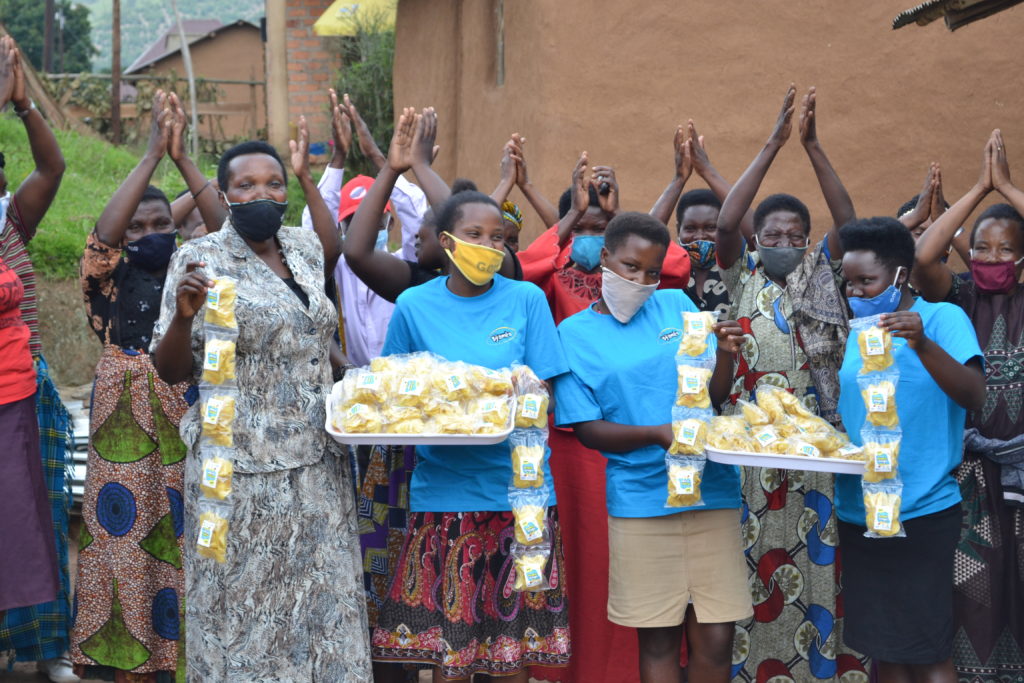
Kellen Abarigye, Peace Monday, Guadansia Kyarisiima, and Slyvia Kyomuhangi, all members of Kabungo Self-Help Project, appreciate the support from IFDC on modern farming practices and listed fake agro-inputs, unpredictable weather patterns, and a lack of modern storage for their produce as some of the challenges they face.
One of IFDC’s main objectives is facilitating the sustainable development of Uganda’s potato sector. Highly nutritious and widely grown, potato is produced across Uganda and approximately 35% is consumed at home. Potato plays a key role in household food security and can generate lucrative incomes for farmers. Uganda’s climate is favorable to potato production and domestic demand is increasing, led by a change in consumer habits. The growth in demand for potato in the country has outpaced the sector’s development, with a seed potato industry yet to fully emerge and available local varieties not well suited to the very young domestic potato processing industry. The sector is being led by the entrepreneurial response of Ugandan farmers to the opportunity presented by domestic potato demand, despite the high cost of production and the risk of disease. The development of a seed potato industry, combined with improved cultivation practices and strengthened supply chains to support the emerging processing industry, means the economic growth potential of Uganda’s potato sector is strong. This growth will also increase the potential of potato to play an important role in food security and household income generation.
A Sector with Potential
Potato production has increased markedly in the past 15 years, with 327,300 metric tons (mt) produced from an estimated 111,100 hectares in 2018, up from 155,000 mt produced in 2005-06. This increase can be attributed to the conducive agroclimatic conditions and farmers’ recognition of the crop’s value in terms of both household consumption and sales potential. Local potato varieties, such as Victoria, Rwangume, and Kinigi, are the most commonly grown, although a number of new varieties are being introduced to the Ugandan market, including the Dutch-developed Taurus, Markies, and Panamera varieties. These new varieties are higher yielding and better suited for processing into products such as chips and french fries. The introduction of new varieties, a stronger seed potato industry, and improved and more intensive cultivation practices could see the potato sector reach its market potential, estimated at U.S. $30,000,000 per year. Uganda’s potato processing industry is only just beginning to emerge, but with domestic demand for potato products growing, combined with the fact that hotels and major food chains are importing potato products (around 3,640 mt annually), the economic opportunity for processing is strong and would open up new local markets for Ugandan potato farmers.
Introducing New Potato Varieties
New potato varieties have been released by the Ministry of Agriculture, Animal Industry and Fisheries. REACH-Uganda facilitated the trials with the Ministry and the National Agricultural Research Organization. REACH-Uganda also lobbied for their approval with the National Varietal Release Committee. All of these varieties are Dutch with the exception of Sarpo Mira. The new varieties include:
- Sagitta (HZPC)
- Voyager (HZPC)
- Connect (Den Hartigh)
- Arizona (Agrico)
- Markies (Agrico)
- El Mundo (STET)
- Sarpo Mira (Danespo)

